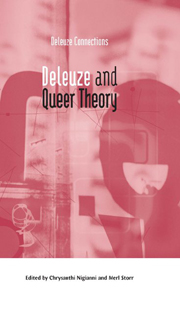Book contents
- Frontmatter
- Contents
- Introduction
- 1 On the Very Possibility of Queer Theory Claire Colebrook
- 2 Thirty-six Thousand Forms of Love: The Queering of Deleuze and Guattari
- 3 The Sexed Subject in-between Deleuze and Butler Anna Hickey-Moody and Mary Lou Rasmussen
- 4 Every ‘One’ – a Crowd, Making Room for the Excluded Middle
- 5 The Adventures of a Sex
- 6 Queer Hybridity
- 7 Prosthetic Performativity: Deleuzian Connections and Queer Corporealities
- 8 Unnatural Alliances
- 9 Schreber and the Penetrated Male
- 10 Butterfly Kiss: The Contagious Kiss of Becoming-Lesbian Chrysanthi Nigianni
- Notes on Contributors
- Index
2 - Thirty-six Thousand Forms of Love: The Queering of Deleuze and Guattari
Published online by Cambridge University Press: 12 September 2012
- Frontmatter
- Contents
- Introduction
- 1 On the Very Possibility of Queer Theory Claire Colebrook
- 2 Thirty-six Thousand Forms of Love: The Queering of Deleuze and Guattari
- 3 The Sexed Subject in-between Deleuze and Butler Anna Hickey-Moody and Mary Lou Rasmussen
- 4 Every ‘One’ – a Crowd, Making Room for the Excluded Middle
- 5 The Adventures of a Sex
- 6 Queer Hybridity
- 7 Prosthetic Performativity: Deleuzian Connections and Queer Corporealities
- 8 Unnatural Alliances
- 9 Schreber and the Penetrated Male
- 10 Butterfly Kiss: The Contagious Kiss of Becoming-Lesbian Chrysanthi Nigianni
- Notes on Contributors
- Index
Summary
TO QUEER: to deviate from expecting norm, to make strange. Example of bad word that has been turned around.
http://dictionary.reference.com/browse/queeringAmerican critics often credit themselves for having invented queer theory. It can be argued, however, that French theorists' rethinking of official philosophy and psychoanalysis after 1968 dealt extensively not only with feminisms but with homosexualities. Much of Michel Foucault's work, but also Hélène Cixous's notions of bisexuality and of homo sexuality (Cixous 1975), or Jacques Derrida's various staging of male couples – Derrida-Genet or Socrates-Plato (Derrida 1974 and 1980) – explored the destabilisation of a self and of what today are called ‘nonnormative sexualities’. It is, however, especially in the writings of Gilles Deleuze and Félix Guattari that the question of homosexuality as queering, that is, as becoming and as an ongoing differing of difference, is raised. From Anti-Oedipus to A Thousand Plateaus (Deleuze and Guattari 1977 and 1987), queering is discussed and performed in the context of the philosophers' attack on ‘normality’ and enforced behaviour in a capitalist, institutionally bourgeois disciplinary society. Deleuze discusses it openly when he writes about his desire to impregnate state philosophers by way of anal penetration. In his translator's preface, Brian Massumi quotes the couple: ‘I imagined myself approaching a [philosopher] from behind and giving him a child that would indeed be his but would nonetheless be monstrous’ (Deleuze and Guattari 1987: 276). For his part, Guattari discusses homosexuals engaged in non-genealogical, ‘monstrous’ becomings.
- Type
- Chapter
- Information
- Deleuze and Queer Theory , pp. 24 - 36Publisher: Edinburgh University PressPrint publication year: 2009

